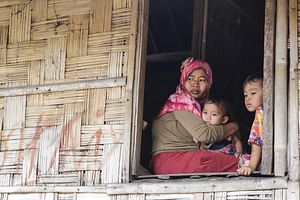We all have a climate story to tell.
As I head for the latest round of UN climate talks (COP23) in Bonn, Germany, relatives in Malaysia tell me that our home state, Penang, has been almost completely submerged by floods, killing seven people and displacing thousands.
I also find out that a colleague and her daughter nearly died while attempting to rescue a drowning family member, while my parents’ house has been flooded. But they were lucky: others lost everything.
Sadly, climate-related disasters like this are becoming the norm in the Asia-Pacific and across the world.
Recent floods and landslides have been among the most severe in years, affecting more than 40 million people in Bangladesh, India, and Nepal alone. Other climate impacts include coastal and shoreline erosion, melting glaciers, the spreading of diseases, and severe droughts and heatwaves, to name just a few.
These occurrences threaten water supplies and livelihoods, force a rise in food prices, and fuel competition and conflicts among communities for depleted resources. Beyond the agricultural sector, they also risk harming the economy and investments.
As with most disasters and shocks, the poorest are the worst hit. Climate-related migration is already hurting some of the most vulnerable communities. In 2016, some 23.5 million people were displaced by weather-related disasters globally, mostly floods or storms.
Asia is considered the most at-risk continent, given its low-lying coastal regions and the density of the population in the region.
Although legal frameworks, both at the national and international levels, have so far failed to recognize the existence of “climate refugees,” the conditions which exacerbate this migration continue almost uninhibited. Some people migrate to other countries, while the poorest usually become refugees in their own land.
In a new report, Friends of the Earth Asia Pacific highlights some of the untold stories of people affected by climate migration.
For example. in Sri Lanka, where nearly 2 million people have been affected by drought, thousands are migrating abroad to places like the Middle East. However, their conditions do not always improve and they cannot secure decent wages due to language barriers and lack of education.
In Papua New Guinea, rising sea levels mean that indigenous communities living in Manus province are no longer able to fish or grow crops, and may also have to become climate migrants. As Chokal Manuai from the Pere Alalau Association told us, “Our entire lifestyle depends on the sea.”
And in the Philippines, climate change is already forcing women to take on jobs that force them away from their children and families.
Clearly, the impacts these people are suffering are not their own fault, but the symptom of a crisis for which developed nations and multinational corporations are primarily responsible by relentlessly extracting and consuming fossil fuels: coal, oil and natural gas.
This year’s climate negotiations are taking place in Bonn but are hosted by Fiji, a country from the Asia Pacific. It’s an opportunity to raise the voices of the millions of communities affected by climate change in the region.
We must also urge governments to look beyond emergency responses to climate disasters, and towards climate adaptation, including addressing the issue of displacement and ensuring justice and protection for impacted peoples.
Rich countries must drastically reduce emissions and provide finance to developing countries to enable them to adapt and address “loss and damage” (as explained further in the Friends of the Earth International report Decade Zero).
We must remember that we are already victims of climate disasters. The time for action is now — before we reach a point of no return.
Theiva Lingam is Regional Facilitator for Friends of the Earth Asia Pacific and co-author of the 2017 report “Calls for just solutions for climate induced migration in Asia Pacific: Untold stories of people impacted by climate change.”
This blog was written with Julia Karlysheva.

































